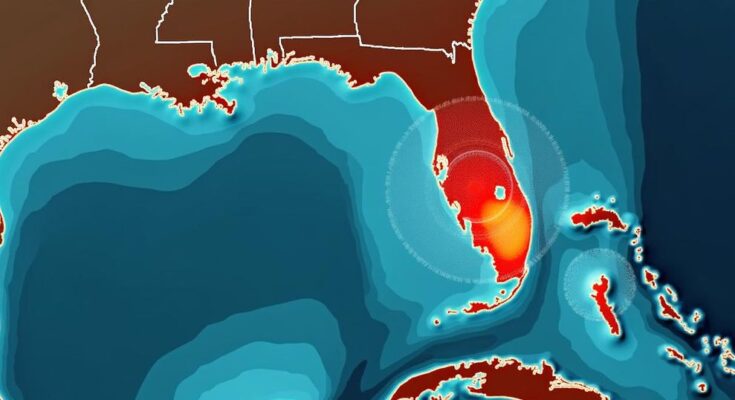Hurricane Helene made landfall in Florida as a Category 4 storm, causing severe damage, flooding, and at least 22 fatalities. Millions lost power across multiple states, while ongoing evacuations were prompted by dam failures in Tennessee and North Carolina. The storm weakened as it moved inland, ultimately influencing emergency protocols in affected regions.
Hurricane Helene struck the Big Bend region of Florida as a formidable Category 4 storm on Thursday evening, resulting in widespread power outages, massive flooding, and tragically, at least 22 casualties. The storm made landfall with wind speeds of 140 mph, approximately 10 miles west of Perry, Florida. This marks the first occurrence of a Category 4 hurricane impacting the Big Bend area since 1851. As Helene wrought havoc in Florida, its effects extended into Georgia and the Carolinas, causing significant concern for residents as the storm progressed. As authorities conducted damage assessments in Florida, focus began to shift towards the northern states affected by Helene. At its peak, the storm disrupted the lives of over 4.5 million people across six states, including Tennessee and Virginia. By Friday morning, the National Hurricane Center reported that Hurricane Helene had weakened to a tropical storm, with sustained winds of 45 mph and was located southwest of Bryson City, North Carolina. The situation escalated in Tennessee as an evacuation order was issued for Newport due to the failure of the Waterview Dam, attributed to rising waters related to the storm. Additionally, residents near the Pigeon and French Broad rivers faced evacuation as local authorities responded to the emergency. North Carolina was not spared, with evacuations also mandated in anticipation of possible dam failures, such as that of the Lake Lure Dam, due to the heavy rainfall from Helene. Historically, Hurricane Helene stands out as the 22nd Category 4 hurricane to impact the United States since 1920, with only four storms classified as Category 5 during the same timeframe. The full extent of the damage inflicted by Helene will take time to appraise, as previous hurricanes have resulted in billions in damages ranging from flooding to infrastructure impairment and power disruptions. This article has been updated to include the latest developments.
The topic of hurricane impacts is critical, particularly in the context of rising ocean temperatures and climatic changes affecting storm patterns. Hurricane Helene serves as a significant case study, demonstrating the destructive potential of hurricanes classified as Category 4, particularly as it makes landfall in vulnerable regions previously untested by such formidable storms. Understanding the implications for public safety, infrastructure, and environmental resilience is vital as regions assess their readiness for future storms. Moreover, the historical context surrounding the frequency and intensity of hurricanes in the United States highlights an urgent need for improved preparedness and response strategies.
In conclusion, Hurricane Helene has manifested as a devastating force, particularly affecting Florida, Georgia, and parts of the Carolinas. With significant casualties and utility disruptions affecting millions, the path of the storm underscores the importance of assessing hurricane preparedness and response capabilities. The events prompted by Helene reflect both the immediate threats posed by severe weather and the longer-term implications for infrastructure and community resilience against future storms.
Original Source: www.usatoday.com




